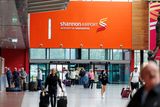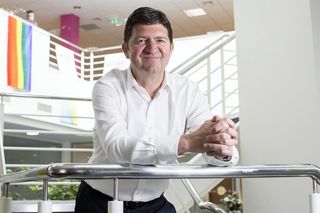'There were a few moments where I thought: Is this real?'
From Anglo's property loans to IAG's bid for Aer Lingus, William Fry boss Bryan Bourke has worked on some of the country's biggest deals. He spoke to Sarah McCabe
Bryan Bourke illustration
Bryan Bourke is on the top of the world, figuratively and literally. We meet in an expansive, half-finished boardroom on the top floor of William Fry's new offices at Grand Canal Place in Dublin's trendy docklands region. Builders hang around every corner; the firm will properly move in that weekend but there is still work to be done.
The place is impressive, all vast lobby and glass. It's a rain-spattered grey April day outside, but that does not take away from the view from the sixth floor. From where Bourke (48) is sitting at the top of the table, he can see the offices of Google, Facebook and PwC.
Ensconced at the heart of corporate Ireland, it is a fitting location for the firm that is advising on the two biggest deals of the year, the restructuring of AIB and the bid for Aer Lingus by IAG.
Bourke took over the top job at Fry's, as those in the know refer to it, last November. As with all managing partner changeovers at big law and accounting firms, he was voted into the role by the rest of the company's partners. He replaced Myra Garrett, who has gone back into practice.
He is friendly but measured over paper cups of coffee bought from an Insomnia nearby; the coffee machines that litter sleep-deprived big law firms have yet to be installed. He lives in Ballsbridge - next-door neighbour to ex-KPMG managing partner and serial board member Terence O'Rourke - but hails from Mayo. All traces of a Mayo accent are gone by now though, obliterated by three decades of practising law in Dublin and London.
Fry's is more than 150 years old, founded in 1857. It is the smallest of the elite group that makes up Ireland's six largest corporate law firms. State favourite Arthur Cox leads the pack with 269 qualified solicitors working for it at the end of 2014, according to the Law Society, followed by Matheson, A&L Goodbody, McCann Fitzgerald, Mason Hayes & Curran and then Fry's, with 177 solicitors.
Bourke's career began in the late 1980s after he left Trinity with a law degree, having briefly flirted with architecture.
He trained with A&L Goodbody and then spent a brief period with one of the UK's biggest firms, Herbert Smith, where he worked on the privatisation of British Coal. He was back in Dublin by 1996 for a job in Fry's.
"Growth cycles were brief in the Irish economy at that stage and I had people telling me that if I didn't go home then, I never would have. With the benefit of hindsight I probably shouldn't have listened to them.
"But I never saw myself living in London long term. There are a lot of tired-looking people on the Tube."
Back in a Dublin that was firmly in recovering mode, he was soon working for some of the biggest names in Irish business, advising companies like Smurfit, DCC and Irish Life. One of the earliest major deals he worked on was the merger of Jurys with the Doyle hotel group in 1999. "It was huge. They were far and away the biggest hotel chain in the country with hotels in the US and UK as well as Ireland. That was a really big transaction at the time, on the front page of every newspaper. That's a big deal for a junior solicitor."
Once you've won the client, they usually stay on. He worked on Jurys Doyle again in 2006 when it was privatised for €1.1bn, and a year later when its Jurys Inn budget chain was sold.
His next career milestone was leading two major deals that closed in a single day at the end of October in 2006. They were the auction of Norwegian state company Statoil's Irish business, which was bought by Topaz for €285m, and the management buyout of Davy stockbrokers from Bank of Ireland. Topaz was owned by Ion Equity at the time and had also just bought Shell's Irish business.
"To close those two deals on the same day was amazing. They were two of the biggest deals in the country. They are still talked about today. That was a big buzz of a day for me, there were a few champagne corks popping at the end of it all.
"Statoil was exciting because it was really the first big auction process to take place in Ireland, the first of its kind, though they are common now."
He got a taste for auctioning with British Coal. "It was a new idea, creating competitive tension to drive up the price while at the same time reducing the contractual comforts that the seller has to give to the buyer".
Today, Nama and IBRC have made the auction process ubiquitous and he is not as big a fan as he was. "Now if you are acting for a client on the buy side, a lot of the time the deal doesn't go ahead - and you have to cut a deal on fees or whatever. It has more complications for the bidder than a normal sale process."
He is in nostalgia mode now, recalling all the late nights towards the end of the Statoil deal where his team thought it was nearly over the line - only for Merrill Lynch to walk in and say, you're going to bring the other underbidders in and get them up to the same price, and then start again.
The same thing famously occurred on the night the Jurys Inn deal was done in 2007, when property was changing hands in Dublin at higher prices than in London. Various bidders and their advisers were arranged on different floors of Fry's old offices at Wilton Place, with investment bankers scurrying between them in the small hours of the morning with details of the latest offer.
One of the most troubling memories Bourke has from those heady days concerns the Statoil deal. Each of the three bidders for the petrol station chain, he says, were funded by Anglo.
"That was a little bit disturbing. Anglo knew what the bids were, and it was actually bidding against itself. That was one of those moments… there were a few moments in my career where you stopped and thought: 'Is this real?' And that was one of those moments. You wondered, you know - how could that be. How did they maintain their internal confidentiality between bidders?"
There's less pausing for thought today. "Back then, deals were all being funded by Irish banks. It's a little bit different now because there is a lot of money coming in from overseas. It's not all being bankrolled by the Irish banks, far from it."
From the lofty highs of closing the Statoil and Davy deals on the same days, there were also major career lows. Even during the Celtic Tiger, deals collapsed at the last minute. "We never worked on any major ones, but there were a few." It also worked with Anglo on a lot of property deals in the years before the crash, including its contentious Quinn loans. It still acts for the receiver of Quinn, KPMG's Kieran Wallace.
And then came the financial crisis. "Mergers and acquisitions activity fell off a cliff once the IMF arrived. It went from one extreme to the other; we had gone from working on deals in the billions to everything just grinding to a halt."
Fry's corporate and property teams were decimated. Most of the lawyers in those divisions were moved to teams that still had work, like insolvency or funds. Around 15 people were let go, a mixture of property lawyers and administrative staff. But the big firms still fared vastly better than the wider legal community - solicitor numbers collapsed during the recession.
Business started to pick up in 2011, accelerated by the arrival to Ireland of US real estate giant Kennedy Wilson, which would eventually buy up half of Dublin. It was a major client win for Fry's. Bourke was the lead partner on Kennedy Wilson's first major Irish deal, its purchase of Bank of Ireland Real Estate Investment Management.
"I did that transaction, actually. And we were kind of scratching our heads as to why they were buying a real estate management business here when real estate was where it was. But it was huge foresight." Months later, Fry's was working on the real estate firm's purchase of hundreds of millions worth of shares in the bank, in a deal that kept the lender out of State hands.
It also advised Canadian superstar investor Prem Watsa and US tycoon Wilbur Ross on their Bank of Ireland investments. "That was the turning point for M&A and I think for people's general attitudes about where the country was going. The international community's heads turned a little bit towards Ireland. They saw that we had very credible investors putting money in here, that we had a bank that had stayed out of State ownership. As a practitioner, things started to change then.
"Property started to move forward, there was a whole load of banking work, we started to see more corporate transactions."
Other post-recession deals included the purchase of the private client arm of collapsed stockbroking house Bloxham for Davy. Fry's also worked on the purchase of Dublin-based drug maker Covidien by US giant Medtronic and pharmaceutical company Actavis' relocation to Ireland.
This year now looks like it's going to be the firm's busiest yet. Advising IAG on the Aer Lingus deal and the Department of Finance on the privatisation of AIB are big contracts. The latter was probably particularly competitive. Traditionally, State work is handled by rival Arthur Cox. Bourke is handling that deal himself.
He admits he is biased, but really wants to see the Aer Lingus sale to IAG go ahead. "At a very simplistic level, Aer Lingus is a small company. They've done a great job getting back to profitability, but they had some very dark days.
"The Government used to have to help them out from time to time… their history hasn't always been so positive. There may be challenging times again, the airline industry is consolidating."
The argument over Heathrow slots is overdone, he thinks. "I was part of the team that worked on the IPO of Aer Lingus years ago and I remember the debate about the Heathrow slots, the desire to keep them. I would have felt back then that was very important. But time has moved on. If you look at the number of flights coming into Ireland and the number of people operating flights between Ireland and the UK - there's a lot of them. I think the world has moved on."
He expected a decision by the Government on its stake by the end of April, he says (our interview took place earlier that month). Still no white smoke six weeks later.
It won the contract to advise the state on AIB, whose chief financial officer is his cousin Mark Bourke, about two months ago. The capital restructuring is expected to take a long time, with only tentative talk of an IPO raised by Finance Minister Michael Noonan.
"The reason we are involved now, at this early stage, is that if there is a transaction, whether it is a sale or an IPO process, what you don't want to find is that you did something when reshaping your capital that creates a problem when it comes to an IPO or a buyer. The planning when it comes to something like this is critically important for its success at the end."
It's a fascinating deal, so of course I plug for information. The lawyer in him kicks in. There's a big smile, and then: "I really can't comment."
Join the Irish Independent WhatsApp channel
Stay up to date with all the latest news














